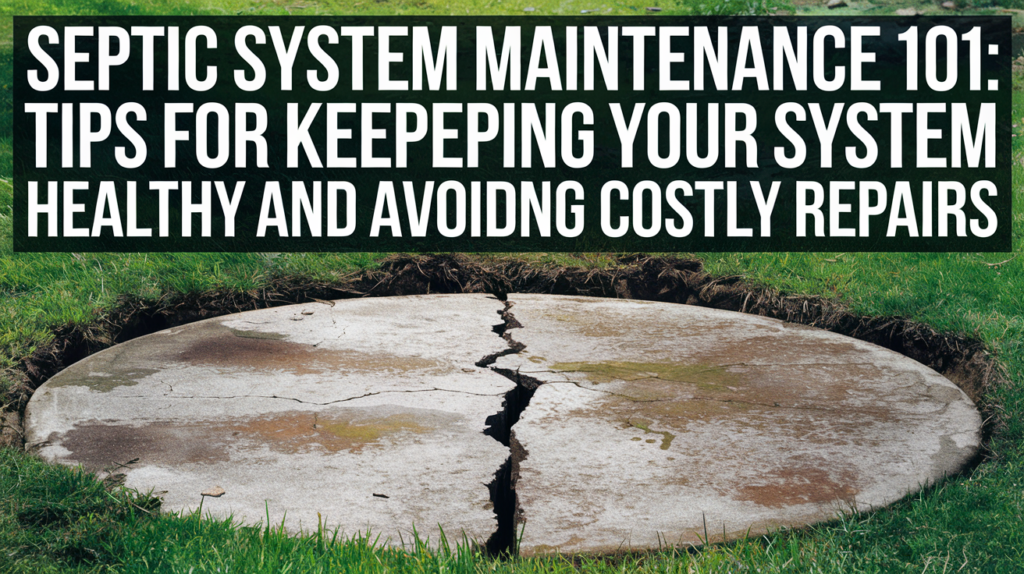A well-maintained septic system is essential for protecting your home, your family’s health, and the environment. Regular maintenance not only ensures that your septic system functions properly but also helps you avoid costly repairs and prolonged system life. In this article, we’ll share five essential tips for keeping your septic system healthy and preventing common issues that can lead to expensive fixes.

Tip 1: Regular Inspections
One of the most important aspects of septic system maintenance is scheduling regular inspections. A professional septic system inspection should be conducted every 1-3 years, depending on factors such as:
- The size of your household
- The age of your septic system
- The frequency of system usage
During an inspection, a septic professional will:
- Check the sludge and scum levels in your tank
- Assess the condition of the tank, pipes, and drain field
- Identify any potential issues or necessary repairs
Local septic services, such as A&A Septic Services and Bob’s Septic Service, can help you schedule regular inspections and ensure your system is in proper working order.
Tip 2: Pumping the Tank
Regularly pumping your septic tank is crucial for removing built-up solids and preventing clogs and backups. The frequency of pumping depends on factors such as:
- The size of your tank
- The number of people in your household
- The amount of wastewater generated
As a general rule, most septic tanks should be pumped every 3-5 years. However, signs that your tank may need pumping sooner include:
- Slow drains or frequent clogs
- Foul odors near the tank or drain field
- Sewage backups in your home
The cost of septic tank pumping varies depending on your location and the size of your tank, but it is a relatively inexpensive maintenance task compared to the cost of repairing a damaged system. Local septic pumping providers, such as Roto-Rooter and ABC Septic Pumping, can help you determine the appropriate pumping schedule for your system.
Tip 3: Proper Waste Disposal
What you put into your septic system has a direct impact on its health and functionality. To keep your system running smoothly, avoid flushing or disposing of items such as:
- Non-biodegradable materials (e.g., plastics, dental floss)
- Harsh chemicals (e.g., paints, solvents, drain cleaners)
- Cooking grease and oil
- Coffee grounds and eggshells
- Wet wipes and sanitary products
Instead, dispose of these items in the trash or at appropriate waste facilities. For food waste, consider composting or using a garbage disposal sparingly, as excessive use can contribute to the rapid buildup of solids in your septic tank.
Tip 4: Water Conservation
Conserving water is not only environmentally friendly but also helps maintain the health of your septic system. By reducing the amount of water entering your septic tank, you can:
- Prevent the tank from becoming overloaded
- Reduce the risk of clogs and backups
- Allow the system to process wastewater more effectively
Some simple ways to conserve water include:
- Fixing leaky faucets and toilets promptly
- Installing water-efficient fixtures (e.g., low-flow showerheads, dual-flush toilets)
- Running dishwashers and washing machines only when full
- Taking shorter showers and turning off the tap while brushing teeth
By implementing these water conservation practices, you can help extend the life of your septic system and avoid costly repairs.
Tip 5: Protecting the Drain Field
Your septic system’s drain field plays a crucial role in filtering and dispersing treated wastewater back into the soil. To keep your drain field functioning properly, it’s essential to:
- Avoid driving or parking vehicles on the drain field
- Keep livestock and heavy equipment away from the area
- Plant only grass or shallow-rooted plants near the drain field
- Divert roof drains and other surface water away from the drain field
Proper landscaping around your septic system can help prevent soil erosion and ensure adequate drainage. Consider working with a local landscaping professional to develop a plan that protects your drain field while enhancing your property’s appearance.
Conclusion
Maintaining a healthy septic system requires regular inspections, pumping, proper waste disposal, water conservation, and drain field protection. By following these five essential tips, you can avoid costly repairs, extend the life of your system, and ensure that your septic system continues to function effectively for years to come.
Remember, proactive care is always better than reactive repairs when it comes to septic system maintenance. If it’s been a while since your last inspection or pumping, don’t hesitate to schedule a maintenance check with a local septic professional. By investing in regular maintenance, you can save money, protect your property, and enjoy the peace of mind that comes with a properly functioning septic system.

